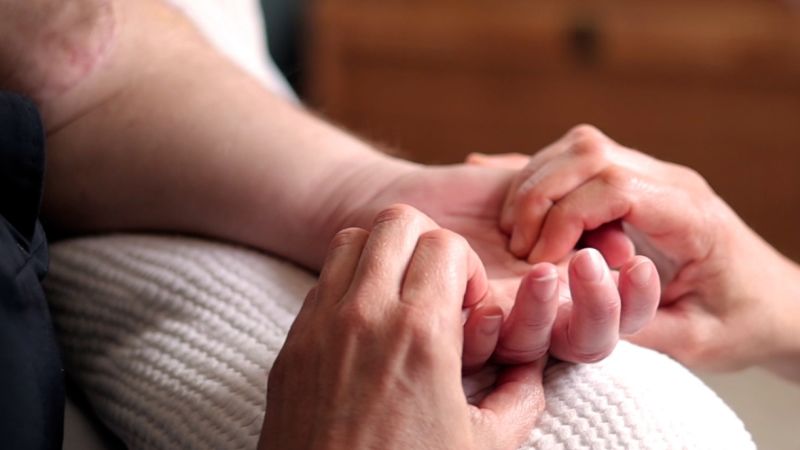Luka Krizanac’s journey from losing his hands to reclaiming his ability to perform daily tasks is not only a remarkable medical narrative but also a testament to human resilience and adaptability. Just a few months ago, Krizanac recorded a simple video of himself preparing coffee using an espresso machine—an act that most would consider mundane. Yet for Krizanac, who lost his hands due to severe complications from an infection as a child, this moment was laden with profound significance.
At the age of 12, Krizanac faced a life-altering event when a mismanaged infection escalated into sepsis, resulting in amputations of both arms and legs. Nearly seventeen years later, he underwent a double hand transplant at Penn Medicine, offering a rare chance to regain not just the functionality of his hands but a critical aspect of his identity. Hand transplants, as highlighted in recent studies, are exceedingly rare—only 148 had been performed globally up to mid-2023. This makes Krizanac’s surgery all the more extraordinary, involving a team of over twenty medical specialists and lasting around 12 hours.
As Krizanac’s anesthesia began to fade, a nurse at his bedside reported that he exclaimed, “Look how beautiful my hands are.” Although he cannot recall that moment, the essence of his sentiment remains; it encapsulates what it means to feel whole again. In his own words, Krizanac expressed that he didn’t mean “beautiful” in a superficial sense, but emphasized a deeply rooted feeling of restoration and completeness as a human being.
Living without hands posed challenges that overshadowed his experiences of losing his legs. While he managed to live with leg prosthetics, the absence of hands thwarted his ability to perform a myriad of essential activities, making everyday tasks exceedingly complicated. Krizanac articulated, “I don’t think the question is even, ‘What can’t you do?’ It’s ‘How can you live?’” This underscores the extent to which hands are integral to autonomy—handling the subtleties of daily life, from eating and personal hygiene to cooking and expressing emotions, is simply unparalleled.
Despite the challenges, Krizanac remained fiercely determined not to let his disability define him. He actively sought avenues to improve his quality of life, which led him and his family to pursue the option of hand transplantation over the years—a complex journey plagued by obstacles including insurance issues and access to skilled providers. In 2018, fortune smiled upon him, and he finally connected with Dr. L. Scott Levin, chair of the Department of Orthopaedic Surgery at Penn Medicine. Dr. Levin quickly recognized Krizanac’s potential as an ideal candidate for the procedure, recognizing his intelligence, awareness, and the robust support system he had in place.
However, the journey was not that simple. Krizanac faced delays due to the global pandemic, compounded by skin wounds on his legs that hindered the timing of the transplant. Dr. Levin and his team took remarkable steps to navigate these hurdles, including traveling to Switzerland to treat Krizanac’s legs, ensuring he would be ready for the hand transplant in due course.
Once preparations were complete, Krizanac was swiftly notified that a suitable match had been found—a rare opportunity that ignited a flurry of excitement. Without reservation, he underwent the surgery, which involved a meticulously staged collaboration of numerous medical professionals, addressing the intricacies of the transplant, such as nerve regeneration and blood vessel connection. The outcome of such operations can remain uncertain, as nerve recovery takes time and is not guaranteed.
Today, Krizanac is healing well and experiencing significant neural recovery, showing remarkable progress faster than many transplant patients. He currently engages in physical therapy several times a week and follows a medication regimen necessary to prevent rejection of the transplant. These medicines not only stabilize his body’s response but also aid in nerve regeneration, crucial for restoring full functionality.
Only a month post-surgery, Krizanac could already use his phone with his new hands—demonstrating a rapid return to independence. He vividly recalls a pivotal moment of tactile awareness when he felt the temperature of water while washing his hands, representing a major milestone in his journey toward regaining autonomy.
Dr. Levin emphasizes that while hand transplantation is often viewed as an elective procedure, it deserves the same attention and dedication as other critical organ transplants, reinforcing the importance of expanding research and clinical support in this field. Krizanac’s aspirations extend beyond merely returning to his previous state: he dreams of driving a car and embracing life as an independent adult—goals that now feel tangible and achievable.
In summary, the revitalization of Luka Krizanac’s life following his hand transplant serves not just as a medical milestone, but also as an inspiration about the human will to overcome adversity and reclaim aspects of life that are integral to one’s sense of self. Through small victories—like perfecting his coffee-making skills—Krizanac is steadily rediscover












